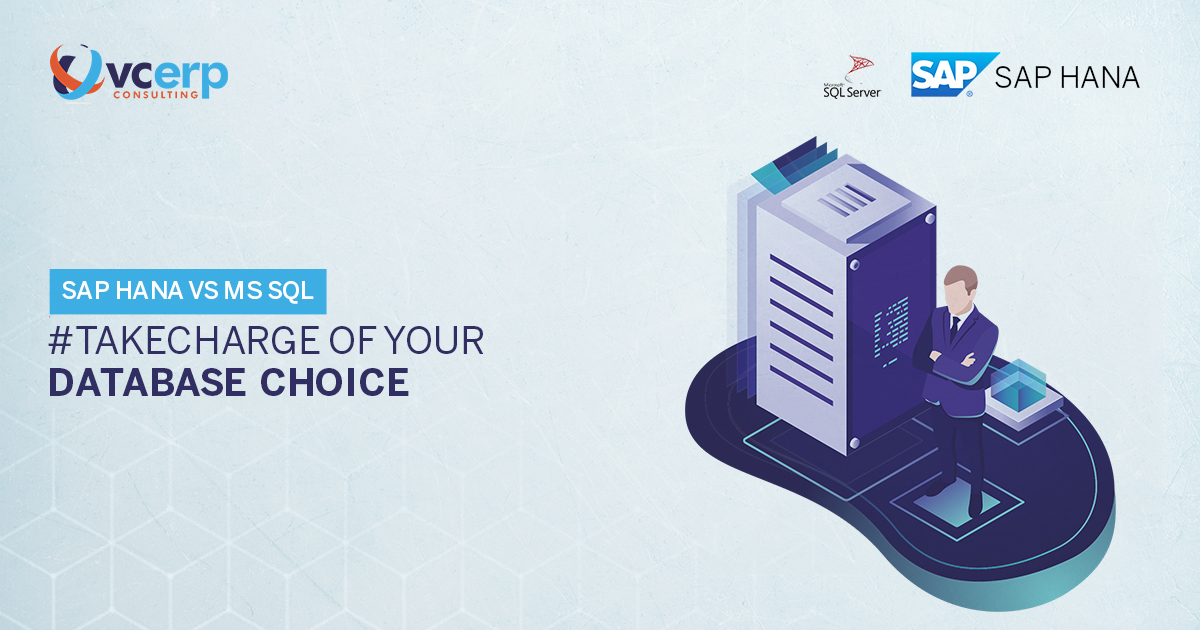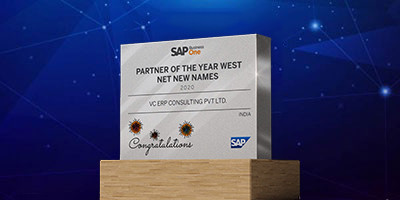
The ongoing global health crisis has affected organizations across industries and domains leading to disruptions in ways of doing business. The crisis is still ongoing and businesses continue to struggle with rising uncertainties in market trends, demand & supply and increased competition.
To overcome increasing disruptions, businesses are moving away from legacy accounting software and transforming their business landscape by adapting enterprise solutions.
SAP ERP Solutions like SAP Business One for SMBs and SAP S/4HANA for large enterprises are helping businesses transform their processes offering complete operational visibility and flexibility.
Implementing a complete business management solution like SAP Business One comes packed with its own set of options – database choices, server hosting options, add-ons, reporting mechanism and the list goes on.
In this article, we aim to explain the databases – the difference between Ms SQL and SAP HANA database to help you decide which is best suited for your business. However, let’s start with the basics first.
It is usually controlled by a database management system (DBMS). Together, the data and the DBMS, along with the applications that are associated with them, are referred to as a database system, often shortened to just a database.
Microsoft SQL is the popular, commonly used WagonR that serves the purpose of transportation accelerating from 0 to 100 in 20 seconds.
In other words, MS SQL Database is built for the basic function of storing & retrieving data on a hard disk as required by other applications. It can be run either on the same computer or on another across a network.
The latest version of MS SQL is Microsoft SQL Server 2019.
In other words, SAP HANA Database is a multi-model database that stores your critical business data in its memory. This results in faster data processing than that of a disk-based database, allowing for advanced real-time analytics.
The latest version of SAP HANA Database is SAP HANA 2.0.
Now that we understand what MS SQL & SAP HANA is, let us explore the fundamental difference between these two databases and make the right database choice to power your SAP ERP Solutions.
As the data is stored in the RAM and BI software you don’t need a separate database for analytics. Run analytical reports instantly with SAP HANA database for multiple users who need to access different databases for different purposes at the same time.
Gain real-time insights into data and utilize unique features in SAP Business One on SAP HANA implemented by SAP Business One Solution Provider company VC ERP Consulting with an extensive industry-experience from the last 20 years.
Yield a greater ROI and value for your company. Get in touch with award winning SAP Gold Partner, Certified Consultants and Advisors at VC ERP Consulting for Free Consultation.
Call +91 7948998911 (India), Whatsapp +254 111229970 (Kenya), Call +1 469 915 6026 (North America) or drop an E-mail at sayhello@vc-erp.com
To overcome increasing disruptions, businesses are moving away from legacy accounting software and transforming their business landscape by adapting enterprise solutions.
SAP ERP Solutions like SAP Business One for SMBs and SAP S/4HANA for large enterprises are helping businesses transform their processes offering complete operational visibility and flexibility.
Implementing a complete business management solution like SAP Business One comes packed with its own set of options – database choices, server hosting options, add-ons, reporting mechanism and the list goes on.
In this article, we aim to explain the databases – the difference between Ms SQL and SAP HANA database to help you decide which is best suited for your business. However, let’s start with the basics first.
What is a Database?
A database is a collection of structured information or data typically stored electronically in a computer system. It is like an information center where all the information is stored in a consolidated manner.It is usually controlled by a database management system (DBMS). Together, the data and the DBMS, along with the applications that are associated with them, are referred to as a database system, often shortened to just a database.
Why is it essential?
It is designed to store all your critical business information. It stores and retrieves critical and sensitive data volumes of your business such as employee records, transactional records, salary details etc. It manages large volumes of data on a daily basis.What is the value of the database in your SAP ERP Solution?
Easily access, manage and update your critical business data with database systems. Communicate information related to your sales transactions, product inventory, customer profiles and marketing activities within seconds.- Eliminate data duplication with single database and minimize errors
- Accurate information to all the users through a database
- Update data easily and quickly
- Ensure data security using secure logins
- Database ensures that the data is accurate and consistent
What is MS SQL Database?
Let’s say SAP Business One is a car. You can buy a WagonR or a Mercedes as per your utility – Microsoft SQL or SAP HANA.Microsoft SQL is the popular, commonly used WagonR that serves the purpose of transportation accelerating from 0 to 100 in 20 seconds.
In other words, MS SQL Database is built for the basic function of storing & retrieving data on a hard disk as required by other applications. It can be run either on the same computer or on another across a network.
The latest version of MS SQL is Microsoft SQL Server 2019.
What is SAP HANA Database?
Taking the car analogy forward, SAP HANA is a powerful Mercedes that speeds from 0 to 100 in 5 seconds with a powerful roar resonating deep within your vehicle.In other words, SAP HANA Database is a multi-model database that stores your critical business data in its memory. This results in faster data processing than that of a disk-based database, allowing for advanced real-time analytics.
The latest version of SAP HANA Database is SAP HANA 2.0.
Now that we understand what MS SQL & SAP HANA is, let us explore the fundamental difference between these two databases and make the right database choice to power your SAP ERP Solutions.
Why select SAP HANA Database over MS SQL?
High-Speed Performance & Scalability
SAP HANA stores your critical business data directly in the RAM memory unlike MS SQL that reads data from hard disk. Eliminate the need to read data from the hard disk before moving the data to your RAM for processing. This results in high-speed performance and extraordinary processing capabilities making your business run faster with quick access to large volumes of data.Extra-Ordinary Analytics Capabilities
SAP HANA database with its in-memory capabilities, performs advanced analytics like predictive analytics, spatial data processing, text analytics, enterprise search, streaming analytics and graph data processing. The database supports high processing features for real-time analytics.As the data is stored in the RAM and BI software you don’t need a separate database for analytics. Run analytical reports instantly with SAP HANA database for multiple users who need to access different databases for different purposes at the same time.
Unique Business Benefits of running SAP Business One on SAP HANA
SAP HANA and MS SQL both support the core business features for SAP Business One. Moreover, if you are running SAP Business One on HANA Database you get access to unique features that are not available for MS SQL.- Pre-packaged with 50+ dashboards and KPIs
- Slice and dice your critical business data with excel-based interactive analysis
- Retrieve information quickly without opening multiple files with Enterprise Search functionality
- Forecast business trends with forecasting functions like cash flow forecast & inventory forecast
Make the Right Choice Now!
SAP Business One on SAP HANA is the better option if you are a small or medium business that needs to speedily process massive volumes of data and transactions.Gain real-time insights into data and utilize unique features in SAP Business One on SAP HANA implemented by SAP Business One Solution Provider company VC ERP Consulting with an extensive industry-experience from the last 20 years.
Yield a greater ROI and value for your company. Get in touch with award winning SAP Gold Partner, Certified Consultants and Advisors at VC ERP Consulting for Free Consultation.
Call +91 7948998911 (India), Whatsapp +254 111229970 (Kenya), Call +1 469 915 6026 (North America) or drop an E-mail at sayhello@vc-erp.com







